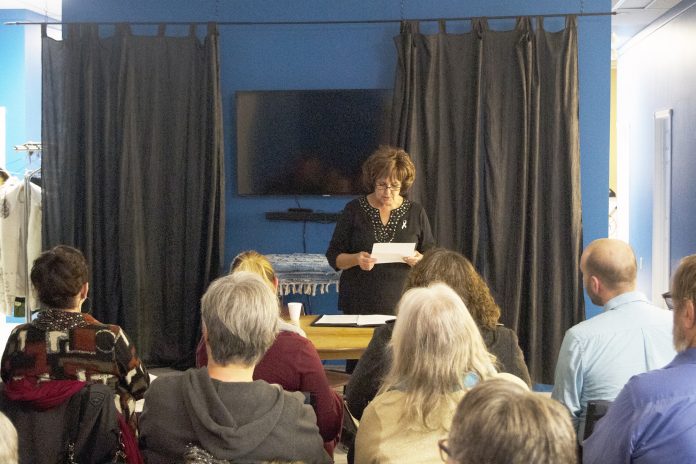
Patricia Leson still remembers where she was on Dec. 6, 1989.
The retired teacher and former vice-principal was in school, dealing with the fallout that erupted in a different classroom on the other side of the country.
On that day, a man entered École Polytechnique in Montreal, armed with a hunting knife and semi-automatic rifle, and proceeded to shoot and kill 14 women. The news was both stunning and frightening.
“It made us feel more vulnerable, no matter where we were,” said Leson, who remembers discussing the issue with other female teachers at school. “We always thought of schools as safe places to send our children (and) to be ourselves.”
For Leson, who currently serves as the president of the Prince Albert Council of Women and vice-president with the National Council of Women Canada, the biggest question following the shooting was, “what can we do?” Today, she has a few answers.
As she gathered with roughly 30 other Prince Albert residents on Thursday to commemorate the victims of the École Polytechnique shooting, the talk turned to the future, and how both men and women can ensure a similar tragedy never happens again.
“It is a family issue,” Leson said. “It’s not just women who are affected and it’s not just men who are affected…. The children are the ones who, if they witness this, perpetuate it, and it’s something that we really must put an end to.”
Progress has been slow, but steady. In Prince Albert, the West Central Native Women’s Association opened the city’s first women’s shelter in 1980. It was subsidized on a per diem rate, meaning available funding depended on how many women were using it. At that time, the goal was simply to provide a safe place for abused women to hide from their tormentors. Changing hearts and minds was a long ways away.
Today, the Prince Albert Safe Shelter for Women houses 173 individual women a month, along with their children, and operates a Second Stage Housing program.
Although things are starting to improve, executive director Carol Soles said the Montreal shooting still casts a long shadow.
“You heard about it and it was tragic, but I didn’t realize the impact that it was going to have,” Soles remembered. “We need to look at history and we need to learn from it. We need to use history as a map for us to make changes in the future.”
When it comes to eliminating abuse against women, the Second Stage Housing program has arguably been Prince Albert’s biggest success. Although the safe shelter does receive some government support, Second Stage operates entirely independent of federal and provincial funding.
The program boasts a success rate of more than 80 per cent, meaning at least four out of every five women who go through leave their abusive relationship and don’t get involved in another one.
“That’s the key, because the pattern (of violence) repeats,” Soles explained. “(It’s) just not always with the same person.”
Like Leson, Soles believes educating the next generation is key to stopping violence against women. If today’s youth can understand that violence is unacceptable in all circumstances, then tragedies like the one on Dec. 6, 1989 might become a thing of the past.
“We can’t change what happened, but we can change going forward,” Soles said. “If we can teach them that violence is not okay in any way, shape or form going forward, then that pattern will repeat.”
The National Day of Remembrance and Action on Violence Against Women was first held in 1991. In addition to remembering the 14 women killed at École Polytechnique, it also commemorates Canada’s missing and murdered Indigenous women.
@kerr_jas • jason.kerr@paherald.sk.ca

